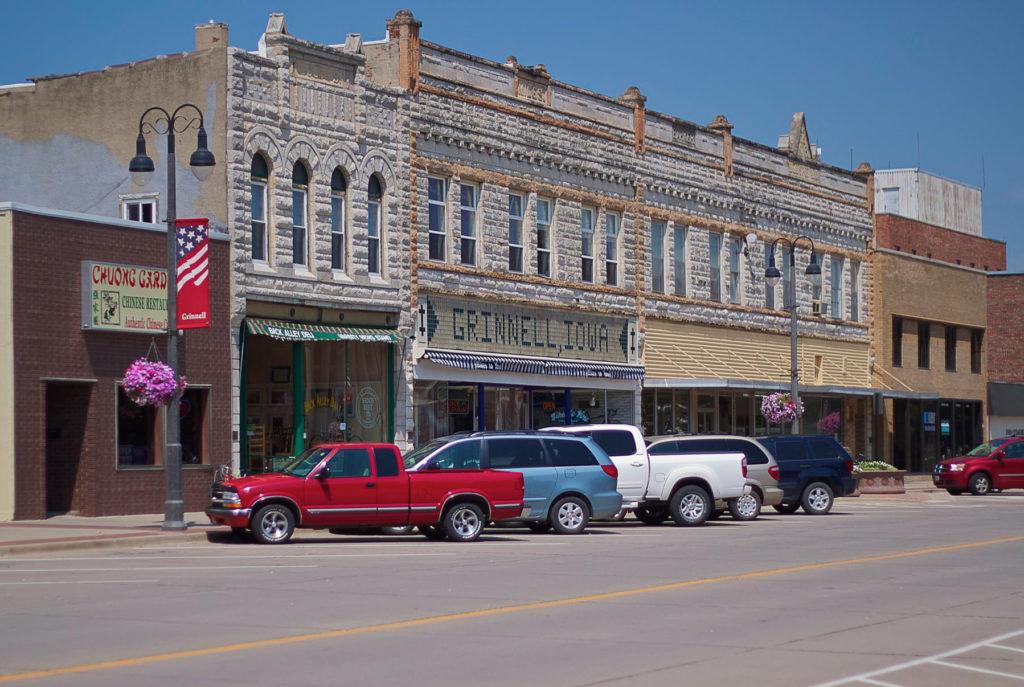Every year, people who grew up in Grinnell attend Grinnell College as students. Their experiences are as unique and diverse as every other Grinnell student, but their love for the town and the College is dynamic. Some have even stayed in town after graduating and work for the College, or as doctors, or as teachers.
Head women’s cross country coach Sarah Burnell `14 was a first-generation college student whose mother worked for the College. She looked at other small Midwest liberal arts schools, but knew Grinnell was the right fit.
“I was looking for a campus community that really fit me … and finding a team that felt like I could be myself with,” she said.
She said the College’s presence influenced her childhood because she grew up around people from all over the country, many whose parents moved hundreds of miles to work at the College. Burnell attended science camp, Spanish camp and the Big Brothers/Big Sisters program through the College.
“Not everyone grows up in a college town and gets access to those things,” said Burnell.
Like Burnell, Jeff Phelps `73 had a mother who worked for the College. Phelps attended the College with four of his peers from Grinnell-Newburg High School, each of whom also had a parent affiliated with the College.
After graduating, he remained in Grinnell and worked a variety of different jobs locally, and in 1999, he founded Saints Rests, a coffee shop which has become a fixture of social life for college students and residents of the town alike.
He could attend Grinnell because of the tuition remission program. The current program means children of College employees pay 10 percent tuition if their child is admitted to the school (or any Associated Colleges of the Midwest).
Phelps originally wanted to go to University of Iowa, but his test scores were high enough to be accepted to Grinnell.
“It [Grinnell] ended up being one of the best experiences of my life. I wasn’t what you would call a book smart person, but I learned a heck of a lot at Grinnell, and I’ll never regret the decision to go.”
For Jake Hull `24, connections with the baseball and basketball coaches made Grinnell the obvious choice. He knew he wanted to be a doctor and was attracted to their success in post-graduate admittance.
“My baseball coach, Coach Hollibaugh, he’s been coaching me since I was in T-ball. The relationship I have with him is really tight, and that was a major, major key decision in me coming here, as well as the academics,” he said.
Hull’s grandparents are farmers in the area, and he learned about the world of agriculture throughout his childhood, which he loves to share with the students who are from large cities.
“It’s cool to say that we have a field in our backyard that we grow corn and beans … show them things that they’re not used to seeing.”
In contrast, coming to Grinnell College introduced these born-and-raised residents to people of all different backgrounds.
Brian Princer `99 said during his first year, his perspective changed drastically.
“I saw my first bong, learned what a vegan was, met people who are very different from me, who had a very different background, some of whom I became very close friends with,” he said.
Laura Ferguson `90, Princer and Phelps said there’s always been contention between Grinnell residents and college students.
“When I was in high school, there was more town-gown rifts … there were high school students that would harass college students merely for being college students,” said Ferguson.
Each alum and student interviewed said they were deeply engaged in sports or theatre programs at their high school and at the College. None had identical stories of how or why they chose Grinnell, but they all felt their careers and lives were propelled by the College; those still living in town said they want to see the relationship improve between the two.
Princer said most residents in town have expectations of how college students act, but did not treat him differently when he was in school.
“Some of their criticisms [of the College] may be warranted, but some of their stereotypes are way off,” said Princer.
Princer also said that coming from town probably relieved some stress from the transition of starting college for him.
“Even though I had culture shock, I didn’t have the double hit of culture shock that some people have, because I knew the town and where to get things.”
I saw my first bong, learned what a vegan was, met people who are very different from me, who had a very different background, some of whom I became very close friends with. – Brian Princer `99
Tanner Alger `25, whose grandmother has lived here since the 1970s, said in an email that he always wanted to go to Grinnell, even without direct connections to the College.
“Growing up watching the people on campus, seeing these free and beautiful individuals expressing themselves in all these different ways made me fall in love.”
He feels confident that the students have a desire to connect with the community in a more positive way and hopes to be part of building that relationship.
“The College has had a positive influence on the town financially, but it certainly has not reached its fullest potential.”



























































